英语:高一下Unit14 Festivals全单元课件3(旧人教版)
高一英语 Unit14《Festivals》备课资料 旧人教版第一册

Reference for Teaching一、异域风情1. Valentine's DayValentine's Day(情人节)is named for Saint Valentine,an early Christian churchman who reportedly helped young lovers.Valentine was killed for his Christian beliefs on February 14 more than 1 700 years ago,but the day that has his name is even earlier than that.More than 2 000 years ago,the ancient Romans celebrated(庆祝)a holiday for lovers.As part of the celebration,girls wrote their names on pieces of paper and put them in a large container.Boys reached into the container and pulled one out.The girl whose name was written on the paper became his lover or sweetheart for a year.Lovers still put their names on pieces of paper and they send each other Valentine's Day cards that tell of their love.Sometimes they also send gifts,like flowers or chocolate candy.Americans usually send these gifts and cards through the mail system.But some use another way to send this message.They have it printed in a newspaper.The cost is usually a few dollars.Some of the messages are simple and short,“Jane,I love you very much.”Others say more.This one,for example,“Don,roses are red.Violets(紫罗兰)are blue.I hope you love me as much as I love you.Forever,Mary.”Most of the newspapers that print such messages are local,but USA Today is sold throughout the United States and 90 other countries as well.This means someone can send a Valentine message to a lover in a far-away city or town almost anywhere in the world.These messages cost 80 dollars and more.An employee(职员)of USA Today says readers can have a small heart or rose printed along with their messages this year.Will this kind of Valentine'sDay message reach the one you love?Well,just make sure he or she reads the newspaper.2. Cluster-of-lights FestivalPeople travel enormous distances just to be home with their families for this happiest and most important of Hindu holidays.And the homes look inviting,too,throughout the late-autumn week of Diwali,especially at night,as celebrants line window sills,porches,and garden walls with long rows of tiny earthenware oil lamps,whose cotton wicks give off a soft,pulsating glow.Diwali is a sort of New Year,at which time people strive to settle old feuds and quarrels and,if they can afford it,buy brand-new clothes in which to celebrate.In the mountain region,bonfires devour the year's accumulation of combustible garbage;in many cities,fireworks dance across the sky.The festivities honor the victory of Rama—an avatar of the love-god Vishnu—over the ten-headed demon who had stolen Rama's wife,Sita.Devotional music and lamp-lighting ceremonies give way to vegetarian feasts,games of chance,and the exchanging of gifts,usually fruits or sweets.Some Hindu temples display towers of pastries fifteen feet high.二、知识归纳1.春节常用表达归纳春节the Spring Festival正月the first month of the lunar year除夕New Year's Eve正月初一the lunar New Year's Day元宵节the Lantern Festival过年celebrate the Spring Festival春联Spring Festival couplets剪纸paper-cuts年画New Year paintings买年货do Spring Festival shopping敬酒propose a toast灯笼lantern烟花fireworks爆竹firecrackers灯谜riddles written on lanterns灯会exhibit of lanterns守岁staying-up拜年pay New Year call;give New Year's greetings;New Year's visit 压岁钱gift money辞旧岁bid farewell to the old year扫房spring cleaning;general house-cleaning年糕Nian-gao;rice cake;New Year's cake团圆饭family reunion dinner年夜饭the dinner on New Year's Eve饺子Jiao-zi;dumpling汤圆Tang-yuan;dumplings made of sweet rice,rolled into balls and stuffed with either sweet or spicy fillings金玉满堂Treasures fill the home.生意兴隆Business flourishes.岁岁平安Peace all year round.恭喜发财Wish you prosperity.和气生财Harmoney brings wealth.心想事成May all your wishes come true.吉祥如意Everything goes well.招财进宝Money and treasures will be plentiful.祝你一帆风顺!Wish you every success!事业成功,家庭美满!Wish you success in your career and happiness of your family!祝你在新的一年里快乐幸福!Wish you happiness and prosperity in the coming year!祝你幸福一年胜似一年!May each year bring you greater happiness!祝你新年快乐,万事如意!Wish you a happy New Year and the best of everything!祝你新年大吉!Wish you good luck in the New Year!祝你在新的一年里百尺竿头,更进一步!Wish you further progress in the New Year!愿数不尽的幸福和成功与岁同增!May each year bring you greater happiness and greater success!2.表示“目的”的方法归纳(1)用“介词或介词短语”来表示目的:A.用介词for表“目的”,因for有“为了”之意。
高一下学期Unit-14-Festivals.ppt
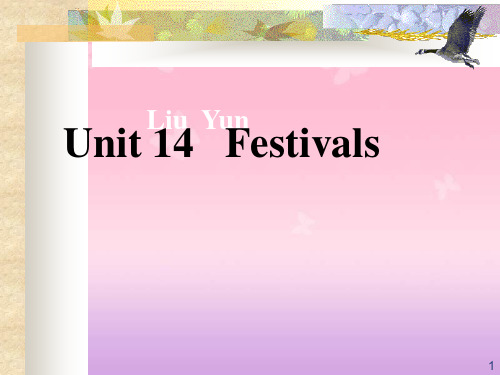
Arbor Day May Day
Clear and Bright Festival ( Tomb-sweeping Festival )
Chinese Youth Day Dragon Boat Festival
Children’s Day
the Army’s Day
Teachers’ Day
Mid-autumn Day
Liu Yun
Unit 14 Festivals
1
2
Lantern Festival
Mid-autumn Festival
3
firecrackers
fireworks
4
Clear and Bright Festival Tomb-sweeping Festival
5
1. Do you know any other names of Chinese festivals? Lantern Festival Women’s Day
month of __B___.
2. A. April or May
B. February of March
3. C. March of April
4. 2. People celebrate Mardi Gras by dressing up and
watch _A___.
5. A. parades
2. Do you know which countries the festivals come from ?
The USA and Europe; Japan; Mexico.
3. 3. What are the people in the pictures doing ?
高考英语 Unit14 Festivals优秀课件 大纲人教版

•
• • • •
2. I will fight for the honour of my country. 我将为祖国的荣誉而战。
3. Will you honour me with a visit? 如蒙造访则荣幸之至。 【用法提示】 1. in honour of 纪念……;向……表示敬意 担保 3. do the honours 尽地主之谊 幸…… 2. on one’s honour 发誓,以人格 4. have the honour of doing 有
考点 4. purpose n. 目的,意图; 用途;效果
• • • • • • • • 【典型例句】 1. His purpose was to graduate from medical school and become a great surgeon. 他的目标是从医科学校毕业,并成为一名好的外科医生。 2. Did you come to London for the purpose of seeing your family, or for business purposes? 你来伦敦是探亲还是出差? 3. She did it on purpose. 她是故意那样做的。 【用法提示】 1. for (the) purpose of 为的是 3. with the purpose of 以……为目的 5. bring about one’s purpose 达到目的 2. on purpose 有意地,故意地,特意 4. serve the purpose 达到……目的 6. for... purpose 为了……目的
•
• •
1. come into conflict with 和……冲突
2. in conflict with 同……相冲突 3. conflict with sb. 和某人有冲突
英语:高一下Unit14 Festivals全单元课件5(旧人教版)
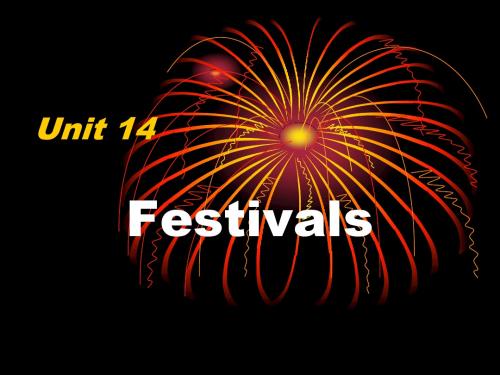
Read the following sentences and decide if they are true or false.
young(It began in 1966)
1 (F )Kwanzaa is a very old festival. 2 (T )The word Kwanzaa means first fruit in Swahili. 3 (T )Kwanzaa is based on old African festivals. African-American 4 (F )People created Kwanzaa to celebrate American culture. 5 (F )Kwanzaa is celebrated on Christmas Day. 6 (T )People who celebrate Kwanzaa light a candle for each of the seven principle.
Easter Bunny
Easter a religious festival
Easter eggs
Listening
Mardi Gras 1. Mardi Gras is celebrated on a Tuesday in the month of _________. A. April or May April B. February or March C. March or
Easter 1. Easter is usually celebrated in ______. A. February or March B. March or April C. April or May 2. In some countries, children will go on ________ during Easter. A. picnics B. egg hunts C. trips 3.The two main popular symbols of Easter are the _________ and the ________. A. Easter Man, Easter egg B. Easter bunny, Easter tree C. Easter bunny, Easter egg
高一英语Unit 14 Festivals 说课课件

第六部分:说教学程序 本节为40分钟标准课,为实现预定教学目标并突出重点、突破难点,我打算通过 以下环节来处理这堂语言知识点课。 (一)导入 让学生根据所学简介Kwanzaa,并设计成填空形式学生再次回顾课文内容,并 自然引出所要讲知识点。 (二)整体呈现本节课所讲知识点 celebrate,honour,,folowing; dress up,take in, v-ing分词短语做后置定语,each time/every time 引导状语从句, (三)各个击破 除了重点词汇和句型外还有两个短语,用法简单易于掌握。 主要是学生通过英汉翻译感悟其含义,通过单选体会并掌握用法 4.Dress up 1)在化妆舞会上那个姑娘装扮成一个女巫。 2)Walking around,I found the city was full of people _________for the festival. A.wearng B.dressing up C.worn D.dressed up 3)Have you seen the girl______in red?She is our monitor. A.wearing B.dressing C.having on D.dressed 4).______ in a white uniform, he looks more like a cook than a doctor. A.Dressed B.To dress C.Dressing D.Having dressed
2. honour 1)I think it a great honour to be invited. 2)I am very honuored to make a speech here. 3) Would you do me the honour of dining with me ? 4)The government has held a ceremony _____those killed in battle. A.in honour of B.instead of C.in favour of D.by means of 5)He felt it ______to have been invited to the party. A. honored B.honoring C.an honour D.honour
高一下册Unit14Festivals47页PPT
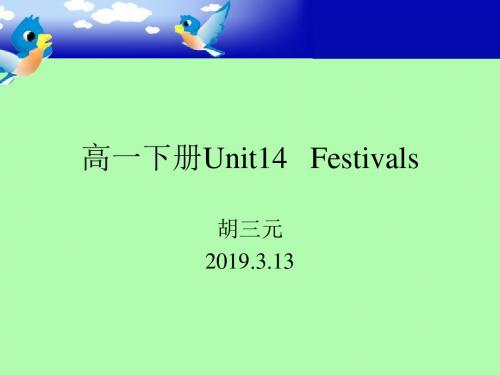
Thanksgiving Day Thanksgiving Day, which originated in America and was first celebrated in 1621 by the pilgrims of the Plymouth Colony, is the most typical and true national holiday of all the holidays observed in the United States of America. Because of the religious persecution by the established church in England, the pilgrims left their native land with the purpose of enjoying religious freedom. They first fled to Holland, and then sailed to America on a ship called the Mayflower. When they arrived at Plymouth, Massachusetts, it was November, 1620. The first winter was very difficult for them and over half of them died because of hunger and illness, hard work and severely cold weather. In the spring of the next year, 1621, a friendly Indian named Squants, who had been captured and released by other English men, came to help them in planting the corn and fertilizing the soil.
高中英语第一册Unit 14 Festivals课件

happiness.
Useful Expressions
In my opinion, we should… I don’t think it is necessary to … I hope we can make a decision. I believe we should… We must decide… If we do this, we can…
Festivals When? Who? How? Why?
Chinese
Foreign
Themes Age
Listening
beads New Orleans costumes celebrate /dress up/ parade
Muslims Arabic Middle East vary lunar calendar stay up
2. Ramadan is one of the most important festivals for Muslims. The name of the festival comes from the Arabic month in which it is celebrated. Ramadan is celebrated in countries all over the world, especially in Africa and the Middle East. The time for celebrating Ramadan varies each year. People celebrate it in the ninth month of the Arabic lunar calender. During Ramadan, people must not eat during the day: from when the sun comes up to when the sun goes down, people celebrating Ramadan will not eat or smoke. When the sun has gone down, however, the celebration begins. People often stay up all night eating, singing and dancing.
高一英语Unit14 Festivals课件 人教

festival Information
Mardi Gras
Ramadan
Easter
country
New Orleans, South of the US
Esp. in Africa, the Middle East
Countries throughout the world
(US and Europe)
Obon Japan Floating paper lanterns
O-bon or Bon Festival is celebrated all over Japan as an all soul's day. The few days are celebrated to greet the souls returning from the other side to be with the living (a happy event). After three days, the souls are led back to the sea by paper boats with candles lit to show the way until they return next year. It is sometimes called the Lantern Festival. Traditional dances are performed in parades and neighbors feel free to join in.
高一英语下册 Unit14 Festivals(第三课时)教案 大纲人教版第一册
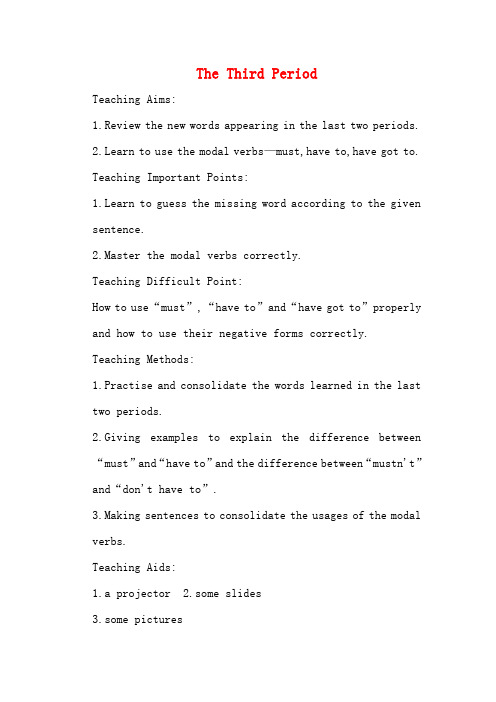
The Third PeriodTeaching Aims:1.Review the new words appearing in the last two periods.2.Learn to use the modal verbs—must,have to,have got to. Teaching Important Points:1.Learn to guess the missing word according to the given sentence.2.Master the modal verbs correctly.Teaching Difficult Point:How to use“must”,“have to”and“have got to”properly and how to use their negative forms correctly.Teaching Methods:1.Practise and consolidate the words learned in the last two periods.2.Giving examples to explain the difference between “must”and“have to”and the difference between“mustn't”and“don't have to”.3.Making sentences to consolidate the usages of the modal verbs.Teaching Aids:1.a projector2.some slides3.some picturesTeaching Procedures:Step Ⅰ. GreetingsGreet the whole class as usual.Step Ⅱ. RevisionT:In the last class,we read the passage—The birth of a festival.By reading it,we've learnt something about Kwanzaa,such as the birth of it,the purpose of it,the way of celebrating it,and the seven principles of it.Now I want to ask you some questions about it.The first one:Who created this festival?Ss:Dr Maulana Karenga.T:The second one:Is it a young or an old festival?When was it born?Ss:It is a young festival born in 1966.T:When do people celebrate it?Ss:From December 26(one day after Christmas)to January 1(New Year's Day).T:How do people celebrate it?Ss:By lighting a candle each day and discussing one of the seven principles of Kwanzaa.T:Why did Dr Karenga create Kwanzaa?Ss:To celebrate Africa-American culture and history.T:Quite right.In fact we are all creating new festivals every year—festivals and holidays are always changing and as we celebrate them,we make new history and develop our culture.All the holidays and festivals help us understand who we are,remember where we come from and share our hopes for a happy future.Do you think so? Ss:Yes.T:So much for my questions about the passage.Besides,we learned some words in it.Do you still remember the meanings of them?Let's do an exercise on the screen.(Teacher shows the screen.)T:Now please look at the screen.Find the right explanation for each of the words.I read the word,and you find and read aloud the right explanation to it.OK?Ss:OK.T:Nation.Ss:Large community of people;country.T:…Ss:……Suggested answers:1—B 2—C 3—A 4—E 5—F 6—G 7—H 8—DT:Well done.Next,we'll deal with Language study.First,Word study.Then,Grammar.Now open your books at Page….Look at the part—Word study.…Are you ready? Ss.Yes.T:Here is an exercise for you to do.Choose the best word to fill in each blank.Change the form of the word where necessary.Three minutes later,I'll check your answers. Suggested answers:1.theme,faith,purpose2.nations,generation,determination3.joy,ancestors,birth4.trick,peace,treatedStep Ⅳ. GrammarT:We all know that Dr Karenga wrote seven principles of Kwanzaa in the reading material“The birth of a festival”.Can you tell me what they are?Ss:They are unity,self-determination,living together,purpose,working together…T:What does“purpose”mean?Ss:We must remember our past and build our future…. T:How about self-determination?Ss:We have to build our own lives,create for ourselves,and speak for ourselves.T:Quite right.(Teacher writes these sentences on the Bb.)Now,please look at the blackboard.In these two sentences,“must”and“have to”are both used to talk about obligation.But their meanings are not quite the same.“Must”is most often used to talk about an obligation that depends on the person speaking of listening.“Have to”is generally used to talk about obligations that come from “outside”.Let's look at another two sentences and compare them.(Teacher writes the fallowing sentences on the blackboard:1.We must be back by ten.2.We have to be back by ten.)T:Xiao Yu,can you tell the difference in meaning between them?S1:Yes.The first sentence means that we think it is necessary for us to be back by ten.The second one means someone else thinks it necessary for us to be back by ten,or means that there seems to be no other choice. T:(To the whole class.)Do you agree with him?Ss:Yes.T:Then when can we use“have got to”?Ss:In informal English,“have got to”can be used instead of“have to”.T:Can you give an example?Zhao Ning,you try,please.S2:It's getting late,so I'm afraid I've got to go.(Teacher writes it on the Bb.)T:Very good.Thank you.Now,please look at the pictures on the screen and describe what an army man must do or have to do.(Teacher shows the pictures and ask the students to describe each of them one by one.)Suggested answers:1.You have to keep your hair short.2.You must stand to attention.3.You have to keep your boots clean.4.You have to get up early.5.You must keep fit./You must do exercises.6.You must salute your superiors.7.You have to learn to use a rifle./You must learn to shoot.8.You must keep your equipment clean./You have to clean your equipment.T:Well done.You've known the differences between them in meaning.Besides,we should know that“have to”has more tenses than“must”.“Must”can only be used to express present and future obligation;past obligation is usually expressed by using“had to”.For example,when I was your age,I had to get up at 5 every morning.But in reported speech,“must”can be used.Look at this sentence:I told him he must make a decision.Have you understood my explanations?(Teacher writes the examples on the Bb while explaining.)Ss:Yes.T:Very good.Now let's go on with the negative forms of them.Li Hua,can you tell us the negative forms of“must”and“have to”?S3:…(Teacher writes the negative forms on the Bb:must not=mustn't;do not have to=don't have to)T:Do they have the same meaning?Ss:No.They have quite different meanings.T:Well.Let's compare another two sentences.(Bb:You mustn't tell George.You don't have to tell George.)T:Li Hui,would you like to have a try?S4:Yes.The first sentence means“don't tell George”.The second sentence means“you can if you like but it isn't necessary”.T:Quite right.Instead of“don't have to”,needn't is often used in British English,so we also say“You needn't tell George.”It has the same meaning as “You don't have to tell George.”Can you understand?Ss:Yes.We're quite clear about that.T:OK.Next,let's do some exercises.Step Ⅴ. PracticeT:Now,turn to Page 9.Look at the first exercise in Grammar part.Here are some greeting manners in the table.First youhave to decide which are necessary and which are not.Then make sentences using“must”,“have to”or their negative forms after studying the given examples below.A few minutes later,I'll ask some of you to read your sentences to the class.Are you clear?S s:Yes.Suggested answers:1.When you're talking with someone,you must look into his or her eyes.2.If you meet a friend from China,you don't have to kiss him on the cheek or hug him.3.When a soldier meets his officer,he must salute him.4.When you are invited to a formal party,you must wear clean clothes.5.If you want to show your respect to others,you must take off your hat when you greet them.(After that,teacher goes on to deal with the second exercise.)T:Next,let's do the second exercise.Suppose you are spending the Spring Festival at your grandparents' plete the following sentences with“have got to”.First do it by yourself,then exchange your work forcomment and correction with your partner.Suggested answers:1.Your school starts tomorrow,so you have got to say “Good-bye”to your grandparents.2.You broke your grandma's favourite vase,so you have got to make an apology to her.3.Your parents went back to work three days ago,so you have got to stay alone at your grandparents' house.4.Your grandparents have given you quite a lot of money,so you have got to consider how to spend it.5.You have done your homework all wrong,so you have got to do it again.6.You do not know when you should go to school tomorrow,so you have got to make a call to ask your classmate.7.Your grandma was seriously ill,so you have got to send her to hospital.8.You have not bought the ticket to return to your home,so you have got to wait to buy it the next day.Step Ⅵ. Summary and HomeworkT:In this class,we've reviewed the new words we learned.And we've also learnt to use the modal verbs“must”,“have to”and“have got to”.After class,review thecontents in this class,paying special attention to the differences between“must”and“have to”and the differences between“mustn't”and“don't have to”.You'd better do more exercises to learn to use them properly.That's all for today.See you!Ss:See you.Step Ⅶ. The Design of the Writing on the BlackboardStep Ⅷ. Record after Teaching_____________________________________ _____________________________________ _____________________________________ _____________________________________。
高中英语Unit 14 Festivals--Period 3旧人教第一册下
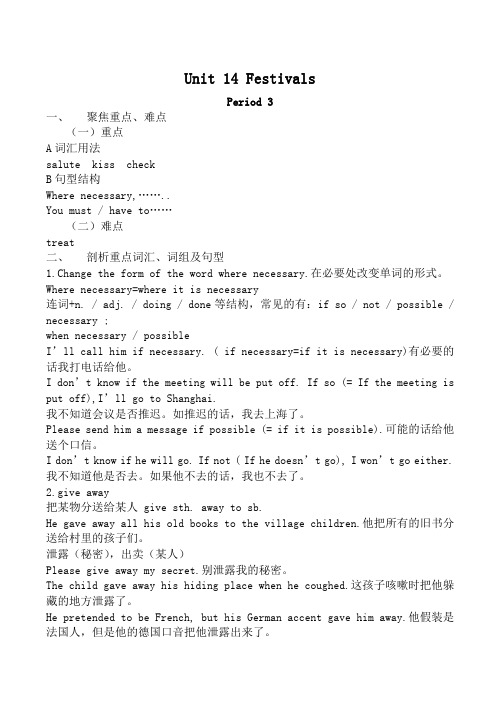
Unit 14 FestivalsPeriod 3一、聚焦重点、难点(一)重点A词汇用法salute kiss checkB句型结构Where necessary,……..You must / have to……(二)难点treat二、剖析重点词汇、词组及句型1.Change the form of the word where necessary.在必要处改变单词的形式。
Where necessary=where it is necessary连词+n. / adj. / doing / done等结构,常见的有:if so / not / possible / necessary ;when necessary / possibleI’ll call him if necessary. ( if necessary=if it is necessary)有必要的话我打电话给他。
I don’t know if the meeting will be put off. If so (= If the meeting is put off),I’ll go to Shanghai.我不知道会议是否推迟。
如推迟的话,我去上海了。
Please send him a message if possible (= if it is possible).可能的话给他送个口信。
I don’t know if he will go. If not ( If he doesn’t go), I won’t go either.我不知道他是否去。
如果他不去的话,我也不去了。
2.give away把某物分送给某人 give sth. away to sb.He gave away all his old books to the village children.他把所有的旧书分送给村里的孩子们。
泄露(秘密),出卖(某人)Please give away my secret.别泄露我的秘密。
高一下册Unit14Festivals-精品
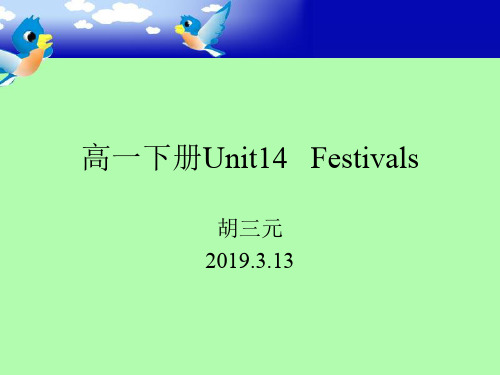
Halloween 1,000 years ago, the Celts living in the Great Britain believed that human is mastered by gods. They also believe that Samhain, the death god, would come back to the earthly world with the dead at the night on October 31. The Celts built bonfires and fired animals as sacrificial offerings to the death god. Some Celts were dressed in costumes made from animal heads or furs, which was the origin of contemporary Halloween masquerade. The night of the death god was a horrifying time that signified the coming of winter and was the beginning of Halloween eve. Today, the religious meaning of Halloween has been weakened; instead, the holiday expresses man’s cherishing memory of Halloween via innovative, ever-changing modern masquerade.
Easter Easter, with its religious character, falls on the first Sunday after the full moon that occurs on or after March 21st. Therefore, Easter happens sometimes in March, and sometimes in April. It commemorates the resurrection of Jesus Christ from the tomb where he had lain for three days following his Crucifixion. His rise after three days indicates that he would accomplish his promise to rise again from the dead as proof of eternal life. As Christ’s return to life had occurred during the season of spring, some of the rites of Spring were still retained. Therefore, we see that although Easter is based on the events in the life of Christ, it has been influenced by older traditions. For example, the custom of dyeing eggs is still very popular among American children. Originally the egg symbolized fertility for the ancient Persians and Greeks who exchanged eggs at their spring festivals. But up to the Christian time, the egg symbolized the tomb from which Christ rose. For Christian lamb is the symbol of the sacrifice of Christ and pig the symbol of good luck. That is why both in Europe and in America, people have lamb and ham as their main meat on Easter Sunday. In all the spring season, people enjoy the Easter message of hope, joy and the resurrection of spirit
高中英语Unit 14 Festival旧人教第一册下

Unit 14 FestivalLesson 1Warming up, listening and speakingStep1 Lead – inTalk about the Spring Festival with studentsStep2 Warming upPart 1 and 2Step3 ListeningFirst, talk about the pictures about three festivals. Then look at the exercises and listen to the tape. Listen for three times.Step4 SpeakingFrom listening, we have learned a lot about foreign festivals. Now let’s talk about some other holidays. You can work in groups of four, and you can use the useful expressions on Page 10.Step4 HomeworkWrite a passage “How I spent the Spring Festival”.Lesson 2ReadingStep1.lead-inWe have learned something about some foreign festivals.Today we are going to read about another festivals ----Kwanzaa. Step2.Fast---readingRead the passage fast to find the main idea of it , which is the main idea of the passage ?(c)A.How Karenga created Kwanzaa.B.What are the seven principle of Kwanzaa.C.Why Karenga created Kwanzaa.D.How Karenga got the idea of creating Kwanzaa.Step3.True or FalseExx on Page 11Step4.careful ---readingRead the passage carefully to finish the following exercise .1.Which of the following is not true according to the test?A.Kwanzaa is a young holiday .B.The word Kwanzaa means first fruit in Swahili.C.Dr Karenga created Kwanzaa to celebrate American culture and history .D.kwanzaa is based on old African festivals .2.The celibration of Kwanzaa lasts _______(A)A.7days B.5days C.6days D.11days3.Why did Dr.Karenge creat the festival?(B)A.Because there was no festival in Africa.B.The African history and culture can be kept alive in African –Americans.C.Because he thought African festivals were better than American ones.D.He wanted to be remembered by African .4.From the test we can draw a conclusion that ______(B)A.the African-Americans don’t like Kwanzaa at allB.the African-Americans have a strong feeling for their own history and cultureC.Kwanzaa is celebrated from December 26 to January.D. Kwanzaa was created to celebrate the African culture and history Step 5. ListeningListen to the tape, let the ss pay attention to the pronunciation, stress and intonation.Step 6. Language points1.dress up. 盛装,打扮dress up in…穿…衣服,打扮dress up as…打扮成eg. You don’t need to dress up for this dinn erI just love the fun of dressing up in ancient clothing.The little girl dressed herself up as an angel.2.would 可作情态动词,“过去常常做…”eg. He would sit for hours day dreaming.When I was a child, I would get up early.Homework:1.Recite the language points2.Read the textLesson 3Language studyStep1. RevisionTranslate some important sentences in the textStep2. Word studyFirst let the Ss do the exerciseThen check the answersStep3. GrammarFirst. explain the usages of the modal verbs___ must, have to, have got toThen do Ex2 on pages 13,ex1 on page 74Homework:Revise the usages of the modal verbsLesson 4Integrating skillsStep1. Fast-readingAsk the Ss to read the four holidays and find out which one is the least important. ( April Fool’s Day )Step2. Careful-readingRead the passage carefully to finish the exercise1.which of the following is true according to the text ? (D) A.“Day of the Dead” is an American festival.B.People often feel sad when they celebrate “ Day of the Dead”C.“April Fool’s Day” falls on the 1st day of spring.D.“ Earth Day” reminds us to value our world.2.which of the festival is to celebrate the memory of a great person?(B) A.Earth DayB.Martin Luther King , Jr day.C.Day of the Dead .D.April Fool’s Day.3.The best title for the text is ______.A.some Festivals celebrated in the world.B.Celebration of life..C.Celebration of Great Persons.D.Celebration of Both the living and the dead.Step3. ListeningListen to the tapeStep4. Language points1.care about 关心, 为…担心care for 想, 喜欢eg. She thinks only of herself ; she doesn’t care about other people.Would you care for some tea?2.play tricks onplay a trick oneg. That was an unfair trick to play on her.He was always playing tricks on others.3.take ineg. Please take the washing in, if it rains.They took her in for a week.She didn’t take in what I said.Step5. WritingWrite a short description of the Spring Festival. Homework:Finish the writing.。
- 1、下载文档前请自行甄别文档内容的完整性,平台不提供额外的编辑、内容补充、找答案等附加服务。
- 2、"仅部分预览"的文档,不可在线预览部分如存在完整性等问题,可反馈申请退款(可完整预览的文档不适用该条件!)。
- 3、如文档侵犯您的权益,请联系客服反馈,我们会尽快为您处理(人工客服工作时间:9:00-18:30)。
9.Thanksgiving Day I. A day to mourn the dead 10.Qing Ming Festival J. Offering thanks,
family gatherings and meals
Kwanzaa
Thanksgiving Day
Mother Day on second Sunday of May
The official colors for Mardi Gras are purple, green, and gold. These colors where chosen in 1872 by the King of Carnival, Rex.
Ramadan
Ramadan is the ninth month in the Muslim calendar and, according to Islamic belief, the month during which Allah (God) delivered the Koran to the prophet Mohammed. During Ramadan, Muslims (followers of Islam) do not eat or drink during the day. This is called fasting.
6.Halloween Day F. on the 9th lunar 9th
month as Senior citizen’s 7. Valentine’s Day G. the time of ghosts,
spirits, Gravestones
8.Double Ninth Day H. eating Zongzi to honor
Easter
Easter is observed on a Sunday between March 22 and April 25. It is a religious holiday that commemorates(纪念) the resurrection (复苏) of Jesus Christ three days after his death by crucifixion() some 2,000 years ago. For Christians, Easter is a day of religious services and the gathering of family
C. Muslims fast during the
daylight days
4. Easter
D. catching “beads, the doubloons and cups” thrown by parades
5.Dragon-Boat Day E. honoring love and lovers
4.What’s the purpose of celebrating the “World Environment Day”?
5. On “Peace Day”, no fighting or conflicts are allowed. 6. Many people still believe that when a person dies he starts a new cycle of life.
Obon (Bon Odori) Japan (floating paper lanternห้องสมุดไป่ตู้)
Day of the Dead Mexico November 1st (Lighting candles for prayer to the dead)
Mardi Gras
Mardi Gras is celebrated on a Tuesday and is always 47 days before Easter Sunday. Mardi Gras means "Fat Tuesday", the last day of hearty eating before the penitential season of Lent.
Spring festival
Lantern festival
Valentine
February 14th
Halloween
is celebrated on October 31st in the United States. This is a day when the church celebrates and remembers the lives of the saints.
Father’s Day On the third Sunday of June
Onam
Chu Suk
1.In northern China, especially in the countryside, people celebrate the New Year by dressing up in ancient costumes and going on parades.
2.The celebration of Earth Day can be a reminder that we need to care about the world around us and respect life and nature. 3.Be careful on April 1 st, because your friends may play a trick on you. If you are taken in, you’ll be called “April Fool!”
1. Ramadan
A. celebrated on the 15th day
of the first Chinese lunar month
2. Lantern Festival B. chocolate, bunnies,
coloured eggs for its symbols
3.Mardi Gras
